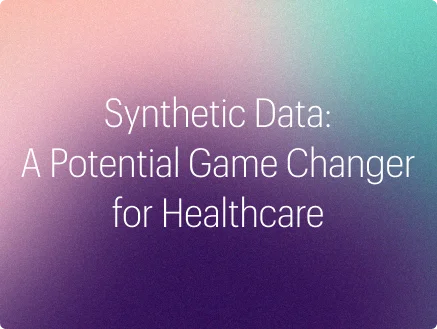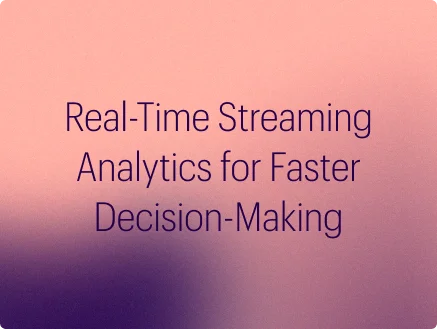Shaping patient-centric models with hyper-personalization
A majority of healthcare systems around the world currently operate on a foundation based on services rather than their patients. Consequently, regardless of how much they attempt to cater to the individuality of patients, healthcare providers (HCPs) must operate within the bounds of prevalent “fee-for-service” business models. However, despite spending the most per capita on health [1], only 30% of US citizens stated that they were pleased with the healthcare services they received [2]. Therefore, a well-researched strategy to enhance patient outcomes has been gaining increasing focus: a shift from a healthcare system that is based on the volume and lucrativeness of services to a patient-centric system that focuses on improved health outcomes.
Patient support programs (PSPs), which offer “beyond-the-pill” services to patients [3] in order to help provide optimal healthcare, arose as a result of this growing emphasis on patient experience. However, these programs, while beneficial for all involved, can cause frustration and dissatisfaction among patients, drive up costs of medication [4], and even create legal challenges for both patients and insurers alike [5] if implemented inefficiently. Therefore, PSPs must be well-designed and provide patients with options that can be tailored to their individual preferences, as this will significantly improve patient experience and health outcomes.
As patients nowadays wish to play a more active role in their own healthcare journeys [6], pharmaceutical firms are attempting to implement patient-centered models for PSPs in a scalable way. This is where hyper-personalization offers great scope for innovation and impact. While pre-personalized PSPs offer generalized services, hyper-personalized programs – which combine powerful predictive analytics and big data to tailor PSP services for individuals – are more likely to address patients’ demands for improved health outcomes. The digital revolution has been helpful in this shift toward hyper-personalization in PSPs: there are now numerous digital technologies that are available to support and implement PSPs to assist patients with disease management while taking into account their individual profiles, backgrounds, and requirements. The vast volumes of data that businesses can now tap into – such as data from wearable devices and social listening – combined with sophisticated analytical models mean that they can acquire a lot more insight into patient habits and behaviors. They can then utilize this data to create PSP services tailored to specific demographics or at-risk patient groups, enhancing therapeutic efficacy. Integrating advanced data analytics into patient support strategies will bring about significant improvements in the following three areas, leading to enhanced patient health outcomes:
- Enhanced financial aid services
- Proactive patient communication
- Hyper-personalized patient profiles contribute to healthcare literacy
1. Supporting financial aid services through hyper-personalization:
Financial assistance is among the most common services offered by PSPs, with companies assisting patients with defraying expenses for prescription medications, covering out-of-pocket costs, or paying for indirect expenses such as travel charges [7]. By evaluating different types of healthcare data, such as claims data, electronic health records, administrative data, medical records, clinical trial & research data, etc., businesses can examine the impact of existing PSP services quickly and efficiently and automatically generate thousands of different PSP scenarios with desired characteristics while accounting for multiple kinds of patient insurance coverage. Such steps allow businesses to create and leverage unique patient profiles to hyper-personalize financial aid suggestions and payment plans, thus making PSPs more efficient.
2. Increasing patient adherence with proactive communication:
Non-adherence in PSPs is an issue of great scale that could exacerbate medical problems, increase disease comorbidity, or even result in death. However, clinical studies have indicated that the most effective adherence techniques are those that are tailored to each patient’s unique habits and circumstances, as well as their medical condition [8]. Traditional methods of increasing adherence, such as wearables that provide reminders, smartphone apps that help users catalog medication dosing instructions, and smart pill bottles that accurately monitor medication intake [9], are now being made more dynamic through the compilation and analysis of health data from both core as well as third-party sources, offering a 360-degree view of the patient. A consolidated view of previous appointments, upcoming consultations, and suggested care activities; personalized marketing and medical information based on decision-making habits; and proactively timed medication reminder notifications are all instances of hyper-personalized outreach methods that are being implemented to improve patient adherence.
3. Hyper-personalized patient profiles contribute to healthcare literacy:
Well-informed patients can monitor themselves better, thus resulting in improvement in their physical and emotional well-being [10]. Healthcare providers (HCPs) can, therefore, leverage data and analytics to implement patient health awareness initiatives that educate their patients about prescription instructions, care methods, side effect awareness information, as well as useful tips for navigating their healthcare plan. This process can be optimized with Health IT, which ensures that every patient receives instructional messages tailored to their health literacy and motivation levels, as well as their preferred channel, language, timing, and locale.
Hyper-personalization in action – the illustrative instance of Ayesha:
Consider the hypothetical but highly prevalent scenario of Ayesha, a recent immigrant to the US who has been diagnosed with a chronic disease. Even though she has internet access, her health literacy skills may be poor due to her unfamiliarity with the English language and medical jargon, which in turn could lead to her taking medication incorrectly, missing treatment schedules, self-medicating, or ignoring diet restrictions that could cause a retrogression or other health-related issues. Here, HCPs could gain a comprehensive image of Ayesha as an individual by combining millions of important data points from a multitude of sources, such as surveys, insurance claims data, peer-reviewed research, as well as administrative and other medical records of individuals with similar backgrounds and medical histories. They will then be capable of understanding the specific consequences formed by the intersection of Ayesha’s faith, native customs, and gender. HCPs can then address issues such as the patient’s HCP preferences, maintenance of religious practices during sickness, fears of prejudice and discrimination, and restricted healthcare access [11].
Ayesha will feel more at ease asking and answering questions if a comfortable environment is created in this manner. HCPs can also use Ayesha’s hyper-personalized profile to predict how she will ask questions and what is important to her, so they can tailor their instructional materials accordingly. They may then enhance their educational efforts by providing simple and jargon-free instructions in Arabic, her native language. This will allow for better engagement and result in efficient and culturally aware treatment.
Personalized PSPs: The future of patient-centric healthcare
Clearly, a well-designed PSP is beneficial for all parties involved. Building hyper-personalized omnichannel PSPs that can support the relevant, targeted audience can help relieve the overburdened health service sector while empowering patients and HCPs to enhance patient outcomes. The transition away from conventional product-centric models to a hyper-personalized patient-centric approach – facilitated by novel technologies and data analytics solutions – not only simplifies the healthcare process but also retains the much-needed human element in healthcare. Thus, PSPs are so much more than simple medical aid; they have the potential to help develop new business models that will redefine the role of pharma in healthcare and society at large.
Bibliography
1. Stasha, Smiljanic. “The State Of Healthcare Industry – Statistics For 2023.” Healthcare statistics for 2021 | Policy Advice | Policy Advice, March 23, 2023. https://policyadvice.net/insurance/insights/healthcare-statistics/.
2. Vankar, Preeti. “Public Satisfaction with National Health Systems by Country Worldwide 2019.” Statista, June 20, 2022. https://www.statista.com/statistics/1109036/satisfaction-health-system-worldwide-by-country/
3. “Patient Support Programs: What Are They and What Do They Offer?: PSPhere.” PSPhere | Digital Patient Support and Management Platform, June 20, 2023. https://www.dksh.com/global-en/insights/patient-support-programs-psps-what-are-they-and-what-do-they-offer
4. Hiltzik, Michael. “Why Big Pharma’s Patient-Assistance Programs Are a Sham.” Los Angeles Times, September 25, 2015. https://www.latimes.com/business/hiltzik/la-fi-mh-pharma-s-sham-patient-assistance-programs-20150925-column.html
5. Haas, Curtis E. “Patient Assistance Programs: The Good, the Bad, and the Ugly.” Pharmacy Times, November 16, 2020. https://www.pharmacytimes.com/view/patient-assistance-programs-the-good-the-bad-and-the-ugly
6. Philips. “New Rules of Patient Engagement: How to Meet the Evolving Demands of the Modern Healthcare Consumer.” Philips, August 26, 2021. https://www.philips.com/a-w/about/news/archive/features/2021/20210819-new-rules-of-patient-engagement-how-to-meet-the-evolving-demands-of-the-modern-healthcare-consumer.html
7. Zafar, S Yousuf, and Jeffrey M Peppercorn. “Patient Financial Assistance Programs: A Path to Affordability or a Barrier to Accessible Cancer Care?” Journal of clinical oncology: official journal of the American Society of Clinical Oncology, July 1, 2017. https://www.ncbi.nlm.nih.gov/pmc/articles/PMC6553813/
8. Biehl, Jacob T, Ravi Patel, and Adam J Lee. “Improving Medication Adherence Behaviors Through Personalized, Technology-Powered Interventions.” CEUR Workshop Proceedings, July 9, 2021. http://ceur-ws.org/Vol-2903/IUI21WS-HEALTHI-3.pdf
9. Aldeer, Murtadha, Mehdi Javanmard, and Richard P Martin. “A Review of Medication Adherence Monitoring Technologies.” ASI | Free Full-Text | A Review of Medication Adherence Monitoring Technologies | Notes, May 6, 2018. https://www.mdpi.com/2571-5577/1/2/14/pdf
10. Heath, Sara. “Why Patient Education Is Vital for Engagement, Better Outcomes.” PatientEngagementHIT, April 7, 2022. https://patientengagementhit.com/news/why-patient-education-is-vital-for-engagement-better-outcomes
11. Tackett, Sean, J. Hunter Young, Shannon Putman, Charles Wiener, Katherine Deruggiero, and Jamil D. Bayram. “Barriers to Healthcare among Muslim Women: A Narrative Review of the Literature.” Women’s Studies International Forum 69 (2018): 190-94. https://www.sciencedirect.com/science/article/abs/pii/S0277539517304028


